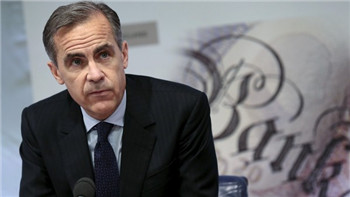
Anyone hoping for a concerted effort to boost global growth will have been disappointed by the familiar combination of bland public conclusions and behind the scenes sniping at the G20 gathering in Shanghai. Policymakers committed to use all tools — monetary, fiscal and structural — to strengthen the recovery. But in reality, many are deferring difficult reforms and hoping that others will shoulder the burden of fiscal expansion. As for monetary policy, there is a clear concern that the latest weapon in central banks’ armoury — the adoption of negative interest rates — may amount to little more than a new way to wage an old-fashioned, beggar-thy-neighbour currency war.
每一個希望各國協(xié)同努力提振全球增長的人,都會對20國集團(G20)上海會議呈現(xiàn)出的令人熟悉的組合——即乏味的公開結(jié)論加暗地里的相互詆毀——感到失望。政策制定者們承諾使用貨幣、財政和結(jié)構(gòu)性政策等一切工具來強化復(fù)蘇。但在現(xiàn)實中,許多國家卻拖延實施艱難的改革,寄望于由其他國家來肩負起財政擴張的重擔(dān)。至于貨幣政策,會議上存在一種明確的擔(dān)憂:央行武器庫里的最新武器——負利率政策——或許不過是換了一種新的方式來發(fā)起老一套的“以鄰為壑”的貨幣戰(zhàn)爭。
Mark Carney, the Bank of England governor, set out this concern most forcefully. It is critical for central banks to structure stimulus measures in ways that boost domestic demand, he argued, so that a “rising tide” of global demand could “l(fā)ift all boats”.
英國央行(BoE)行長馬克慍尼(Mark Carney,見上圖)最為犀利地闡述了這種擔(dān)憂。他主張,央行應(yīng)以能夠增加內(nèi)需的方式來構(gòu)建刺激措施,這一點至關(guān)重要,因為只有這樣全球需求“高漲的潮水”才可以“托起所有的船只”。
Negative interest rates are intended to achieve this, forcing banks to seek out riskier lending opportunities and assets, and encouraging consumers and borrowers to spend. It is plausible and technically possible for them to do so. However, many banks, and policymakers, are proving unwilling to make retail customers feel the full effects.
負利率政策的本意就是達成這一效果,迫使銀行尋求風(fēng)險更高的放貸機會和資產(chǎn),鼓勵消費者和借款者增加支出。這是合理的,在技術(shù)上也是有可行性的。然而,很多銀行和政策制定者并不情愿讓零售客戶充分感受到負利率政策的影響。
Mr Carney therefore argues that there are limits to what the latest burst of innovation by central banks can achieve. If they craft policies in ways that shield retail customers, negative rates are unlikely to do much to stimulate domestic demand. Instead, the main effect will be on the exchange rate.
因此卡尼認為,央行這輪創(chuàng)新能夠?qū)崿F(xiàn)的效果是有限的。如果央行制定的政策繞開零售客戶,負利率就不太可能在刺激內(nèi)需方面起到多大作用。相反,主要受影響的將是匯率。
This is attractive to the country concerned but it rapidly becomes a zero sum game, since “for monetary easing to work at a global level it cannot rely on simply moving scarce demand from one country to another”.
這對有關(guān)國家而言很有吸引力,但這會迅速演變成一種零和游戲,因為“要使貨幣寬松措施在全球?qū)用嫫鹱饔茫筒荒軆H僅依賴于將稀缺的需求從一個國家轉(zhuǎn)移到另一個國家”。
This is a clear criticism of negative interest rates as they are practised in countries such as Japan, which adopted the policy in January but has kept paying interest on most bank reserves, allowing banks to keep rates positive for retail depositors. In the clubby world of central banking, such a forthright attack by Mr Carney on his peers is remarkable.
這是對多家央行實行的負利率政策的明確批評。日本央行從今年1月開始實行負利率政策,不過依然為大部分的銀行存款準備金支付利率,這使銀行能夠繼續(xù)為零售儲戶提供正利率。在央行這個小圈子里,卡尼對同行們?nèi)绱酥毖圆恢M的抨擊是非同尋常的。
His intervention is also important because the European Central Bank is considering adopting a similar tiered system, which might enable it to cut rates even further below zero without undermining confidence in the eurozone’s fragile banks.
而他出面發(fā)出干預(yù)也十分重要,因為歐洲央行(ECB)也在考慮實行與日本類似的分級機制。這種機制或許能令該行將利率進一步下調(diào)到更大的負值,同時又不會降低人們對歐元區(qū)脆弱的銀行的信心。
The ECB faces a difficult choice. With the latest data showing that the eurozone has once more slipped into deflation, policymakers are under pressure to cut the deposit rate further into negative territory at this month’s meeting. If they leave lenders exposed to the full effects, they risk triggering a fresh sell off in banking shares. If they follow Japan’s lead and try to shield banks and retail depositors, they lay themselves open to accusations of currency wars.
歐洲央行面臨著艱難選擇。最新數(shù)據(jù)顯示歐元區(qū)已再次陷入通縮,在本月的會議上,政策制定者面臨將存款利率降到更大負值的壓力。如果他們讓銀行暴露于負利率政策的全面影響之下,可能會引發(fā)對銀行股的新一輪拋售。如果他們效仿日本的做法,試圖把銀行與零售儲戶保護起來,就會讓自身面臨發(fā)起貨幣戰(zhàn)爭的譴責(zé)。
Yet Mr Carney’s criticism is fair. His concerns are likely to be shared in the US, where policymakers are increasingly calling attention to the risks a stronger dollar poses to growth.
不過,卡尼的批評是公道的。美國可能會有人懷有同樣的顧慮。在美國,政策制定者們?nèi)找婧粲跞藗冏⒁饷涝邚娊o增長帶來的風(fēng)險。
It is also correct to warn that “at the global zero bound, there is no free lunch”. The surge in the value of the yen since the Bank of Japan’s move suggests that using negative rates as a tool for devaluation is at best an unreliable strategy. At worst, it risks reinforcing the impression that central bankers are acting out of desperation.
此外,“全球利率零下限環(huán)境下不存在免費午餐”的警告也是正確的。日本央行實行負利率政策以來日元匯率的飆升說明,把負利率作為貶值工具,往好了說是一種不可靠的策略,往壞了說可能會加深央行的行動是出于絕望的印象。
Mr Carney contends it is a myth that central banks are “out of ammunition”. But he ends his speech with an admission that central bankers cannot restore the global economy to health without help from governments.
卡尼認為,央行“用盡彈藥”的說法是無稽之談。不過,他在講話的末尾承認,若沒有來自政府的幫助,各國央行無法讓全球經(jīng)濟恢復(fù)健康。











